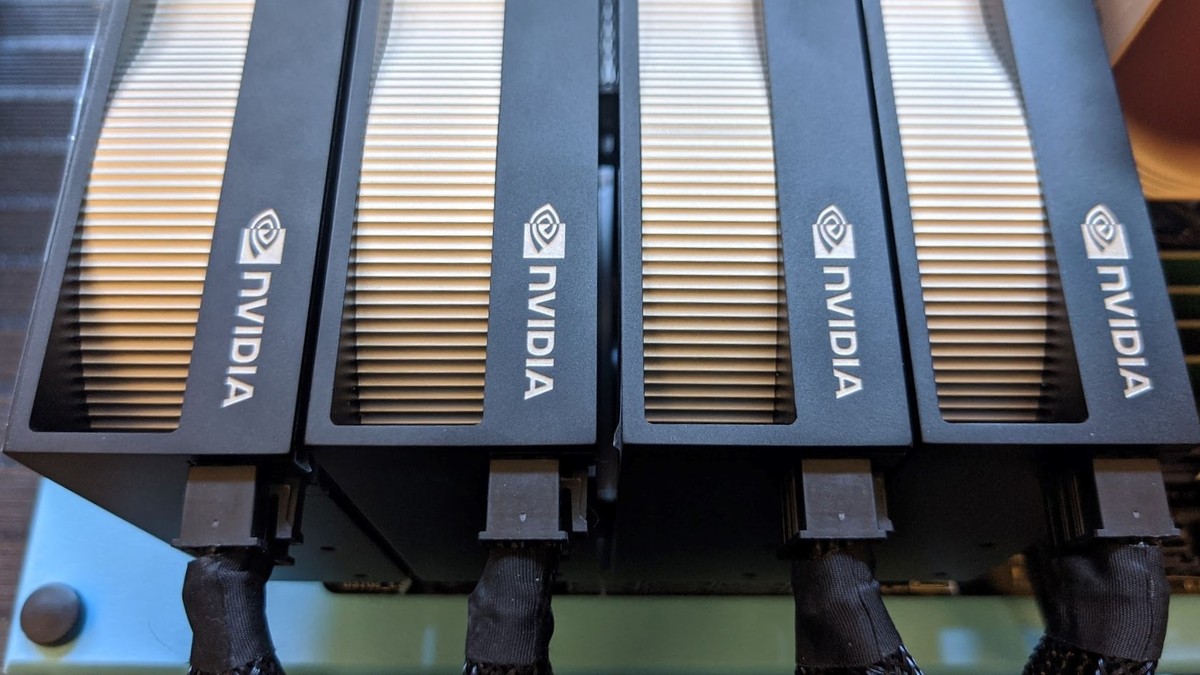Table of Contents
TL;DR: NVIDIA RTX A6000 Multi-GPU Rendering Performance
Running multiple of NVIDIA's RTX A6000 video cards provides excellent scaling in GPU-based rendering engines!
This is no surprise, as it was true with the RTX 30 Series and other GeForce and Quadro video cards as well, but it is still impressive to see what these cards are capable of when used in sets of two, three, or four. However, it is important to keep cooling and power consumption in mind when putting together a multi-GPU workstation. The professional grade RTX A6000 has a cooler designed to work in tandem with multiple cards. Their power draw is high enough that special attention needs to be payed when using four at the same time.
Introduction
Now that NVIDIA’s professional line of Ampere cards, specifically the RTX A6000, have become available, it’s time we look at how multiple cards scale in a single system. Previously we looked into the scaling performance of the GeForce 30 series cards, however, since then blower-style cards have been removed from the market. This means that to get more than two video cards into a system, and cool them effectively, the RTX A6000 is the only option. We are still waiting on official word regarding any lower-tiered cards such as an A5000 or A4000, and will have articles coving those should they appear.
Puget Systems offers a range of powerful and reliable systems that are tailor-made for your unique workflow.
Test Setup
Listed below are the specifications of the system we used for our GPU scaling tests:
| Test Platform | |
| CPU | Intel Xeon W-2235 3.8GHz 6 Core |
| CPU Cooler | Noctua NH-U12DX i4 |
| Motherboard | Asus WS C422 SAGE/10G |
| RAM | 8x DDR4-2933 16GB (128GB total) |
| Video Card | 1-4x NVIDIA RTX A6000 48GB PCI-E |
| Hard Drive | Samsung 970 Pro 1TB M.2 |
| Power Supply | |
| Software | Windows 10 Pro 64-bit (Ver. 2009) Redshift 3.0.33 OctaneBench 2020.1.5 V-Ray Benchmark 5.00.01 |
One thing to note here is that all testing was done on an Intel Xeon platform. The reason for this is power. NVIDIA’s Ampere line of video cards are power hungry. Each A6000 is rated at 300 watts. That is lower than the 350 watts of the RTX 3090, which in our previous testing was too much to comfortably put into one system.
The largest power supplies commonly available in the US are rated for 1600W of internal component power draw, in large part because of the limits of standard 15 amp electrical circuits. At 300 watts each, that is 1200 watts for quad GPUs, leaving only 400 watts for the CPU, RAM, drives, etc. That seems like a decent amount, but some CPUs like AMD’s Threadripper are rated at 280 watts and can take up more than that under a full load. The Xeon on the other hand is rated at 130 watts, leaving us with much more comfortable headroom for the rest of the components in the system as well as any power spikes the system may experience. For the sake of keeping this focused on the GPU performance, all tests were done on the same platform. We do offer a Threadripper option for those looking for more CPU power but who only want 2-3 video cards.
OctaneBench Results
V-Ray Benchmark Results
Redshift Demo Results
Scaling Analysis
As we have seen in the past, GPU rendering scales extremely well across multiple video cards. Octane and V-Ray both scale nearly perfectly from one to four cards. There are minor differences of a percent or two in either direction, but that is not surprising from test to test anyway.
Redshift doesn’t scale quite as well, but still sees good improvements with each additional card. One thing to note on the Redshift test is that it is rendering a single 1920×1080 frame, and reporting back the time in seconds for that render. With four cards, the image was rendered in 50 seconds, while with a single card it was just shy of three minutes. What these scores likely show us is a limitation of the benchmark more than Redshift’s ability to scale with more GPUs. I suspect that with a more intense render, higher resolution, or over multiple frames, we’d see better scaling. Even still, taking the results at face value and going from three to four video cards, we would save 15 seconds per frame. On a 10 minute, 30 fps animation, that would save 70 minutes per render. That really adds up.
Conclusion
Running multiple of NVIDIA's RTX A6000 video cards provides excellent scaling in GPU-based rendering engines!
This is no surprise, as it was true with the RTX 30 Series and other GeForce and Quadro video cards as well, but it is still impressive to see what these cards are capable of when used in sets of two, three, or four. However, it is important to keep cooling and power consumption in mind when putting together a multi-GPU workstation. The professional grade RTX A6000 has a cooler designed to work in tandem with multiple cards, but their power draw is high enough that special attention needs to be payed when using four at the same time.
Puget Systems offers a range of powerful and reliable systems that are tailor-made for your unique workflow.

